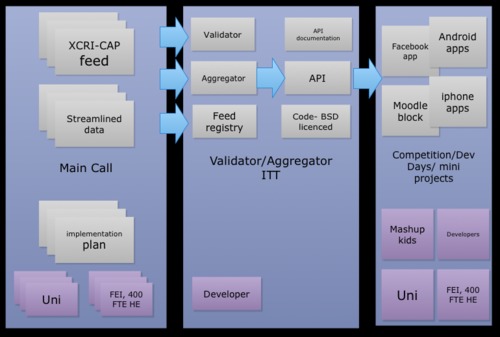The Curriculum Champions list was set up over a decade ago as part of a programme to support the use of ILT in FE. It has around 600 members, covering some 75% of the UK FE colleges, and has representatives from the JISC, JISC RSC’s, LSIS, ALT and AoC.
There were 214 individual posts in June from 75 posters. If you are, or know someone working to support ILT in FE, and feel the list may be of use, please drop me a line.
This is an anonymised summary of the discussions.
3D learning object software:
Bookmarking sites
Various methods of providing curated lists of links have been tried and tested, ranging from a word doc, used as a directory to services like Delicious.
Broadband dongles
Several comments that Vodafone coverage was patchy, and its worth checking out the coverage maps.
It was pointed out that using a USB extension cable can prevent damage to the dongle.
Personally I have T-mobile plan in my 3G android phone which also works with Orange network, giving better coverage, than the Vodafone 3G dongle.
Vodafone good in London and South East, T mobile better outside London to North and West… I’ve recently been using the Android phone as a wireless access point for my iPad.
Social Media
Catering Video
Suggestions for providing access to catering videos, included uploading the video to You Tube or Vimeo, and printing out and laminating a QR code. This provides a wipe clean way of linking, and tracking views.
CDE Lunchtime Seminar
-ULCC’s James Ballard seminar on the Personalisation of Learning, it is easy to synchronise the two as you can hear when James clicks on new slide!
Default college browser
Most respondents indicated the college used IE by default.
Issues with Dawson Era- e-book provider and IE8 precipitating a college to investigate into a move to IE9, or Firefox, but raise questions about the ability to push a common bookmarks list as part of the build. It seems possible port a list in Firefox:
http://firefoxatwork.blogspot.com/, but there are alternatives to the favourites list (see “bookmarking sites” topic) such as using Diigo:
http://www.diigo.com/tools/diigolet.
Discussions highlighted issues with IE9 and Moodle2:
– The upload of files fails with a ‘file not found’ or similar message
– The font of docked blocks is virtually unreadable
Some functionality in Sharepoint requires IE to enable integration with office.
Developing Digital Literacies – free JISC Workshops
22 September, The Studio in Manchester
6 October, The Bristol Hotel in Bristol
e-assessment by exam boards
The perception of A level e-assessment was that most investment has been in digitising paper scripts and then marking these online, rather than direct electronic input by the candidate. This was seen as a practical necessity by some, who could not cope when sometimes 1500 students sit an exam on one day.
This is offset somewhat in some vocational areas with the C&G Gola system, which allows bookings of assessments when the learner is ready, and can provide instantaneous results.
Far more take up has been seen in coursework/portfolio assessment processes.
Systems like e-NVQ allow learners to upload evidence, and provide a framework for direct online verification. The ability to inspect any piece of coursework, provides more rigour, and less capacity to hide poor evidence.
E-portfolios specific to apprenticeships and work based quals
The range of functionality provided by different e-portfolio systems means it may be necessary to use a combination to meet specific requirements. Some awarding bodies are producing portfolios directly linked to their awards.
Learning Assistant is good for NVQ/Mapping qualifications.
Assessment manager from ULCC was suggested as an alternative.
Some systems require good web access to use the interface on site visits, which can be an issue. Paperfree maintains a local eportfolio database on a laptop, allowing the assessor to show students their progress, agree targets, update assessments etc, including adding evidence such as pictures, MP3 recordings of students answering questions if they had a specific learning difficulty, video footage for evidence, and any other relevant docs. Then on return to base, laptop will update main web based database.
Mahara provides more of a social learning model, suitable for collaborative
learning. Pebble (Reflect) is more reflective and self managing.
Infolio uses sound files and picture/videos to capture content.
Electronic individual learning plans (eILP)
Discussions took place regarding the merits of various eILP solutions. It was highlighted that it is essential to outline what you hope to achieve from the tool and create a set of functional requirements in consultation with those who will use it. It is also worth investigating how flexible the system is, should requirements change.
Pro Monitor, seems to be quite expensive, but an excellent tool for ‘achievement tracking’ and coaching for attainment. It is limited in how well the student can become involved and develop a reflective approach to their learning, and requires considerable effort on the part of teachers and personal tutors.
e tracker, was considered inflexible by some users.
University of London “eILP plug in and development” for Moodle, received positive feedback from several users. A Case study is available here:http://www.excellencegateway.org.uk/page.aspx?o=299682
Northern Ireland have developed an E-ILP that has been implemented in all FE Colleges.
Vital (
http://www.endsolutions.net/) can replace paper forms with ones that look exactly the same on screen so the learning curve for staff is not too steep.
Free Online IPR Course Now Available > JISC Legal > View Detail
Transforming curriculum delivery through technology: New JISC guide and radio show launched.
A mini-guide to the outcomes of the JISC Transforming Curriculum Delivery Through Technology programme
http://www.jisc.ac.uk/curriculumdelivery, summarises the benefits of technology in curriculum delivery from 15 projects in the programme.
PDF and text only versions can be downloaded and print copies ordered from
www.jisc.ac.uk/curriculumdeliveryguide Accompanying the guide, as part of a series of radio shows entitled ‘JISC On Air’, the latest show entitled ‘Efficiencies , enhancements and transformation: how technology can deliver’ includes interviews with two projects involved in the programme, discussing the impact achieved in two very different contexts and disciplines. Listen here
http://www.jisc.ac.uk/whatwedo/programmes/elearning/jisconair.aspxIf I had £ to buy 3 tablets
Suggestion were requested for android and win7 tablets, and the usual caveats about buying to meet user needs were expressed. Those tablets in use include:
Archos tablets (70 and 10) run android. The 70 model has a 250Gb drive but the device won’t connect directly to other USB device such as a camera (despite what it says on the website). The 10 model works fine but only has 6GB of storage. Apart from Android itself, the only real issue is the screen shape. They are designed mainly to watch HD videos which they do very well complete with HDMI interface but because of that the screen is long and thin so trying to read PDF files is not as good as it could be.
Experience of other tablets has been limited to show models.
Invitation to attend eAssessment Scotland 2011 (which, despite the name, is open to people from around the globe!)
Date: 25-26th August
Location: Dalhousie Building, University of Dundee
Cost: FREE!
iPads in the class room
An example of using iPads was provided: A construction lecturer gets students to video him with a Flip camera doing demonstrations ,e.g. marking out. These are uploaded to YouTube. The students then use an iPad to refer back to the videos when they need to, in the workshop.
The benefits are: the speed of access to the videos, as an iPad comes on in a second; the quality of the videos through the combination of a third generation Flip with the iPad video reproduction; and the personalisation for the student.
Joomdle
Peerwise
http://peerwise.cs.auckland.ac.nz/ a (free) tool to involve students in the creation, sharing, evaluation and discussion of assessment questions, has been trialled in some college and Uni situations with positive results. Case study on RSC Scotland site:http://www.rsc-sw-scotland.ac.uk/case_studies/CaseStudies.htm#MCC
Retirement
Valerie Schicker announced her retirement from the champs list, as well being a source of great help, and friendly advice for many years, Valerie organised the first Informal Champs Conference.
Self Assessment Review of ILT (was RE: VLE Ofsted Re-Inspection)
Many minor fixes have been applied to the Generator, and the senior leadership module is now complete. Over the Summer LSIS will be conducting a series of user evaluation groups and carrying out the final amendments based on the feedback we receive.The new version of Generator will be launched at ALT-C in Leeds in September, LSIS are working with the JISC-RSCs roll out the new tool from September.
Student Council on the VLE?
A college asked for suggestion to add to their list of Student Council uses for the VLE:
– Names (and possibly photos) of members of the Student Council;
– An online ‘suggestion box’;
– A section of the page for each sub-committee;
– Videos for student elections;
– Adding fundraising events to the calendar / uploading flyers.
Several colleges use the Moodle Feedback module to run the student council elections.
The Choice activity can be used for voting.
Documentation:
Minutes/action points of meetings
Agendas for meetings
Downloadable event flyers/posters
Interactive:
Feedback forms
Surveys
Rate Us
Informational:
“You Suggested: We Did…” like they used to have in supermarkets…
Technologies in Sport
use of the WII (especially for lower level learners)
Get students to video their own performance, play it through an interactive whiteboard, which can be paused with indicators drawn on to highlight other players, choices which can be related back to theory (information processing etc).
Alistair offered a number of ideas:
Using PPT – once created a set of slides can be saved as individual .gif images and then bundled together using a free portable tool like UnFreez to create an animated GIF that learners can carry around on their mobile phones.
Create your own stop frame style animations (for example simple biomechanic simulations of hinge points, forces and leverage) using PowerPoint by drawing the first slide, duplicating it, changing the position of elements on the new slide, duplicating this and continuing the iterative changes. Save as gif images, animated through unfreez.
In Xerte toolkits use the Synch video template so that a video stops at key points and presents additional text/image info at that synch point. Not a sport example but slide 11 of
http://xerte5.techdis.palepurple.co.uk/play_3984 will demo nicely.
The ‘multiple perspectives’ template allows you to have different videos on the same page with additional notes and info – eg videos of good, bad and indifferent skill demos.
A staff development resource that covers these more: JISC Techdis support package for inclusive teaching and learning –
http://itq.jisctechdis.ac.uk/#gpm1_2 and the associated taster resource on the top menu.
The future of the National Learning Network materials service
LSIS have worked with Xtensis, to ensure its continued operation for the next two years.
The site will be run by LSIS from July 22nd. Xtensis has kindly granted a free license to use the software that delivers the site, so it will look and perform the same as it does now.
The current service is funded until summer 2011. From that point it will be taken over by LSIS.
All existing links to links to the site – Learner URLs, VLE links and Noodle links – will continue to work as now .
There will no longer be: registration and/login, the facility to create collections.
Users who want to create new collections or store any pre-existing collections associated with their login can copy them across to a new service provided by Xtensis, called XtLearn.
Some of the materials no longer work, either technically because they were based on redundant technology, or in terms of their content (old-fashioned, outdated practice etc). The LSIS survey identified a wish by users to see them brought up to scratch. It also identified members of the community who would be willing to join or lead such developments. LSIS will work with partners to facilitate these developments as far as is practicable.
VLE Ofsted Re-Inspection
A long discussion took place about what to show inspectors with regard to VLE. I tried to summarise it, but I think it needs a little more time. I will try and condense it into something readable








